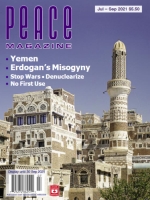
Peace Magazine Jul-Sep 2021, page 5. Some rights reserved.
Prime Minister Narendra Modi is currently serving his second term, both of which he won handily. However, his extremist ideology and socio-economic policies are beginning to grate on even some BJP loyalists. His goal of transforming a nation of religious and cultural diversity into a Hindu majoritarian state, has divided the population, sparked communal clashes and created serious insecurity among Muslims as well as other minorities.
In Kashmir, a dissenter was arrested and subjected to abusive interrogation for speaking with members of a UN Security Council group about the mistreatment of minorities by government officials. Most recently, the Lakshwadeep Islands, a tiny archipelago off the coast of Kerala and inhabited by 65,000—mostly Sufi—Muslims, is experiencing a storm of protests against its current administrator, a close ally of Modi, who has arbitrarily introduced laws that locals perceive to be hostile and unnecessary: a ban on beef, confiscation of fishermens’ properties requisitioned for government use in the future, and an anti-crime bill enabling authorities to detain people for up to twelve months, in a territory that has hardly any crime on record.
Modi’s practice of implementing laws without consultation with experienced professionals or parliamentary discussion, stems from his anti-intellectual ideology and is facilitated by an ineffective opposition: the once powerful Congress party has been reduced to an entity led by the remains of the Nehru-Gandhi dynasty that has not even attempted to forge an alliance with other parties opposed to the BJP.
The Constitution, framed by India’s founding fathers, upheld secularism and basic freedoms for all, but has been repeatedly violated by the current regime. National institutions, including the Supreme Court and Election Commission are no longer free of political pressure.
Even the military are being politicized. Mainstream media and universities are discouraged from airing criticism of government. Consequently, many journalists have been jailed for their dissenting views and prominent academics have resigned.
While the pandemic was raging throughout the country, Modi and Amit Shah, the Home Minister, spent weeks campaigning in Bengal, in attempts to unseat the Chief Minister — an intrepid street-fighter, equally determined to keep Modi’s party out. Eventually, she scored a decisive victory, laying to rest Modi’s goal of dominating the Eastern provinces.
Following a seven percent drop in GDP this year, a former Finance Minister suggested the government consult some of India’s top economists, who advocated more federal spending, cash transfers, and distribution of free rations to the neediest. None of this advice was heeded. Instead, the Central Vista project, a $2/5 billion scheme to construct public buildings to replace the existing ones—designed by England’s greatest architect, Edward Lutyens—is deemed by the Supreme Court as essential.
In short, India can no longer be considered to be a democracy.
Viren Bhuyen, Toronto
In her article, Jody Smiling compares the bombing of Hiroshima and Nagasaki to the Trump-inspired insurrection at the Capitol on January 6th.
Is this a joke? She views an atomic weapons attack on innocent people as equivalent to a protest in Washington, where, by the way, a trespasser was shot to death by a government agent. (I would assume that is one act of police violence she is willing to conveniently overlook.)
Using her logic, the Obama/Biden destruction of Libya should be equal to the insurrection at the Capitol by female protesters during the Cavanaugh hearings. Is that a fair comparison?
How about the destruction of Iraq by the criminal Bush regime, to the burning down of police stations by BLM during the Floyd riots. Is that also a fair comparison?
I found that article offensive, especially to the victims of the Fat Man bombs.
David Maharaj, Toronto